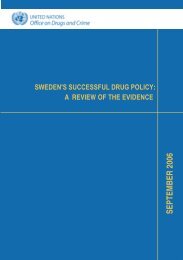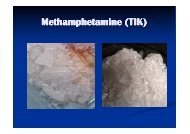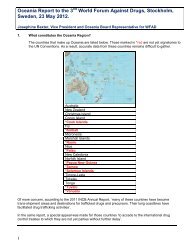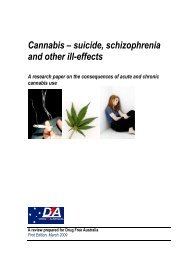International Research Compendium - Drug Free Australia
International Research Compendium - Drug Free Australia
International Research Compendium - Drug Free Australia
You also want an ePaper? Increase the reach of your titles
YUMPU automatically turns print PDFs into web optimized ePapers that Google loves.
These addictive cycles are endless unless the addict seeks help.<br />
Once the addict surrenders to the need for help, the process of recovery and the<br />
renewal of the Self begins.<br />
How addiction begins: The stage of falling in love with the drug(s).<br />
In the beginning, acting out and experiencing the mood change creates fun,<br />
excitement, new ideas and stimulation. This forms the basis for what is known as<br />
euphoric recall – remembering the pleasurable aspects and denying or forgetting the<br />
emotional pain. The person behaves mainly within socially acceptable limits. But<br />
inside the mind, there starts to develop a deep and totally consuming mental<br />
dependency. Like many other diseases, addiction grows and develops within, long<br />
before it reaches a stage where it is recognized by the addict and others. Addiction<br />
starts out as an emotional illusion and becomes entrenched in the addict before<br />
others around the addict or even the addict himself realizes that an addictive<br />
relationship has been formed. The person becomes hooked on the drug(s).<br />
What happens in the brain at this stage:<br />
Initial substance use produces a huge release of dopamine in the Nuc. Accumbens<br />
and throughout the neural circuitry mediating the activation of goal directed<br />
behaviour.<br />
Dopamine D1 receptor stimulation results in the activation of cyclic AMP-dependent<br />
protein kinase (PKA), PKA_induced phosphorylation of the transcriptional regulator<br />
cyclic AMP response element binding protein (CREB), and the induction of<br />
immediate gene products, such as Fos. The induction of Fos and other immediate<br />
early genes promote short-term neuroplastic changes in response to occasional drug<br />
use.<br />
Addiction is progressive and leads to lifestyle change<br />
When drug use continues, acting out starts to lose some of its seductiveness; the<br />
drugs always retain their ability to change one’s mood, but over time much of the fun<br />
starts to vanish.<br />
More energy is redirected to the addictive process. Like any other progressive illness,<br />
addiction will take more of a person’s energy, focus and ability to function, eroding<br />
the ability to be a “normal” human being. Activities and people who were important in<br />
the past are now less important. Time with family, old friends, and hobbies is set<br />
aside to make room for the addiction. Addiction will continuously demand more, and<br />
because the addicted person has lost control, he or she must give in to the demand.<br />
There is an almost constant battle between Self and Addict. Should I act out or<br />
shouldn’t I act out<br />
The behavioural aspects of addiction become more prevalent. Others start to notice<br />
that something is wrong or abnormal and start to see the presence of the Addict. The<br />
addicted person may get labelled as “irresponsible”, “troubled”, “tense”, “crazy”,<br />
“strange” or “weak”.<br />
And the addict starts to build a defence system against attacks from others.<br />
A behavioural dependency starts to develop, which means that the person starts to<br />
act out the addictive belief system in a ritualistic manner, and the person’s behaviour<br />
becomes more and more out of control.<br />
What happens in the brain at this stage<br />
25






